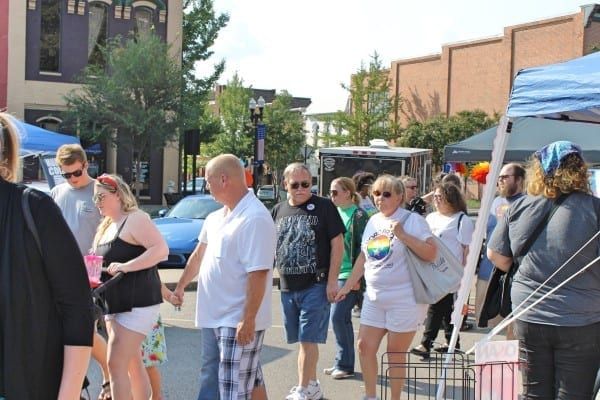by James Cox
Co-Editor, Memphis Triangle Journal
Memphis (Tenn.) - Mention “activist” to most anyone and they flashback to 1969, the Vietnam War and picture the flower-wearing, picket-sign-carrying individual on a mission to save the world.
Forty years later, activists are still on the front lines, but now they’re battling inequality and injustice with fewer flowers and more political savvy.
All across the Midsouth, activists such as Deborah Cunningham are motivated by an innate sense of justice and are taking on a range of issues from fair wages to GLBT equality to equality for people with disabilities. As executive director of Memphis Center for Independent Living, Cunningham is an advocate for people with disabilities, working for the full integration of people with disabilities into every aspect of the community.
“I suppose it goes back to my passionate belief in fairness,” said Cunningham about her desire to create change in the community. “Inequality in the way that individuals are treated makes me nuts. If there is a way that I can help to change that inequality, I always want to try to do it.”
Cunningham’s first taste of activism was a strike back at ignorant movie theatre managers. In the days before the Americans with Disabilities Act required public spaces to be accessible to people with disabilities, Cunningham was forced to park her wheelchair in the aisles at the Highland Quartet movie theatre. Each time, she was asked to transfer to a theatre seat or leave. Eventually, enough was enough. Cunningham organized several of her disabled and nondisabled friends to attend the movies on a Saturday night, the busiest night of the week.
“I was prepared to have them physically remove me and I was hoping that my friends felt the same way but as luck would have it, the theatre manager was so stunned when he saw us all come through the door, he totally ignored us for the entire movie,” Cunningham recalled. “I think I was a little disappointed there had not been a little more drama but of course that was only the beginning. There would be many battles on the same front for years to come.”
At the heart of every activist is a desire for justice, but according to Tommy Simmons, chair of the Shelby County committee for Tennessee Equality Project (TEP), desire alone won’t create change. It comes down to determination.
“Many people are motivated, on a short-term basis, regarding an issue or a candidate,” Simmons said. “However, once the issue is put to rest or the candidate is elected (or defeated), most people disengage. The true activist is a determined one; one that continues to fight for what they believe.”
Volunteers with TEP know a thing or two about determination. In 2006, TEP launched a massive “Vote No on 1” campaign, urging voters to strike down a constitutional ban in Tennessee against same-sex marriage. The amendment passed (80 percent to 20 percent in Shelby County, long considered the state’s most progressive county). For now, Tennesseans can only watch California tie the knot.
TEP remained steadfast, and as a result of their lobbying efforts this year, they played a critical role in striking down a state bill that would have banned adoptions by unmarried couples. The next hurdle, according to Simmons, will be getting an openly gay candidate elected to the Shelby County Commission, the city council or even the state assembly.
Social change doesn’t happen overnight. A true activist must remain resolute and optimistic.
“It’s important to have a ‘long haul’ view of your work as an activist, or else it becomes discouraging to see how slow the process is to make social change,” said Rev. Rebekah Jordan, executive director of the Workers Interfaith Network (WIN).
The network’s mission is to organize people of faith, workers and their allies to improve wages, benefits and working conditions. Although they recently persuaded the Memphis City Council and Shelby County Commission to pass living wage ordinances that would require city and county employees to receive at least $10 an hour if they have health benefits and $12 an hour with no health insurance, WIN’s next battle is taking on employers who refuse to pay their employees, robbing them of thousands of dollars in wages.
The most important resource for any battle is people. Burnout is common among activists, however, and people are constantly needed to fight the good fight. And there is no scarcity of issues in need of a volunteer or 20. It all starts with what you feel in your gut.
“Connecting with an organization that works on the issue you care about is often the best way to start, because no one person can create change by themselves,” Jordan said.
In a busy world, not everyone can spare a few hours or make it their life’s work to create change. But change can start with just one small step.
“The easiest way to be an activist is to write a check,” Simmons said, “regardless of the amount, to your favorite local candidate, local cause or local political organization. Your donation will then be put to good use to make change happen.”
